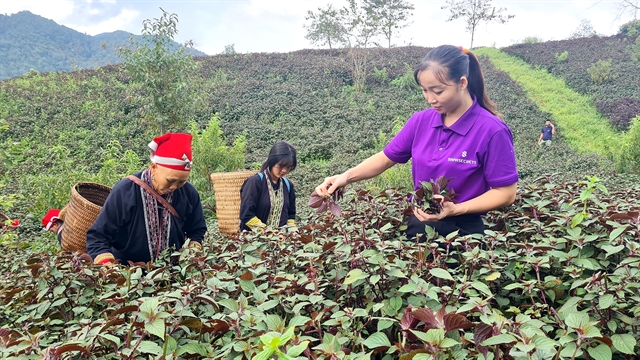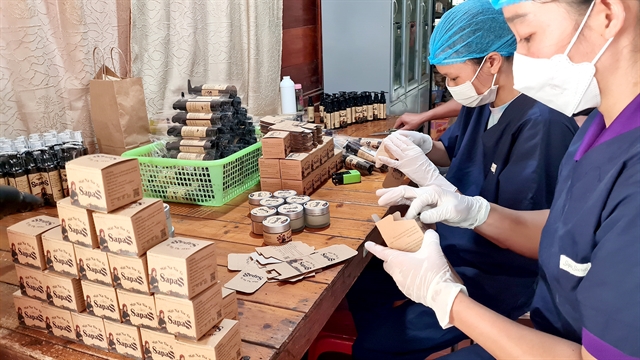 Society
Society


|
| A member of Sapa Secrets Co-operative and members of an ethnic minority harvest perilla in Tả Phìn Commune of Sa Pa District, Lao Cai Province. — VNS/VNA Photo |
LÀO CAI — A herb lover and ethnic villagers in the Sa Pa District of the northern mountainous province of Lào Cai have successfully set up a co-operative.
Discovering the indigenous perilla variety in Tả Phìn Commune has superior quality compared to other varieties, Trần Anh Xuân in Sả Séng Village in Tả Phìn Commune decided to start a business of producing Sa Pa perilla products.
She and six other women set up a co-operative named Sapa Secrets.
The dream of bringing the mountainous herbal plants to the world is being realised by Xuân and the villagers as the co-operative has successfully researched and developed nearly 20 products from perilla that have been well received by customers and earn billions of đồng a year.
The area where raw materials are cultivated is increasingly expanding, creating jobs for hundreds of local workers.
Tả Phìn is known as the cradle of northern mountainous herbs with precious remedies imbued with the indigenous knowledge of local ethnic groups, especially the Dao people.
Possessing a variety of rare herbs in the vast mountains and forests, the Dao people in Tả Phìn have taken advantage of these precious natural gifts for health care.
After graduating from Hà nội Agriculture University in 2014, Xuân – a 24-year-old woman from the northern province of Thái Bình - decided to move to Lào Cai Province’s Tả Phìn Commune to live and start up her own business.
Along with her daily work, Xuân, with a passion for flora, spends most of time going to the forest and learning about plants and herbs.
By chance, Xuân discovered that in Tả Phìn there is a very precious native red perilla variety with darker colour leaves that contain outstanding essential oil content three to five times higher than normal perilla and higher antioxidant content than normal perilla that are grown in lowland areas.
"These outstanding characteristics are due to the fact that Tả Phìn is located at an altitude of 1,450m - 1,500m above sea level, so it is especially suitable for the growth of perilla with high quantity and quality of essential oil," Xuân said.
Xuân started growing Tả Phìn perilla in 2018 in an area of 3,000 sq.m in Sân Bay Mountain in Sả Séng Village.
“At that time, no one in my family or relatives supported me to do that,” Xuân recalled.
“People said that if every family could grow perilla, no one would buy it. And until now, no one had gotten rich from perilla,” she said.
However, ignoring the warnings, she was still determined to do it.
Xuân and six women villagers established Sapa Secrets Co-operative operating with a closed production model from growing, researching to producing products from red perilla.

|
| Packaging perilla products in Sapa Secrets Co-operative. — VNA/VNS Photo |
In the early days, the co-operative had to hire villagers to grow the herbal plants on their own lands and commit to purchasing the plants.
After only three years, Xuân had set up a 3-hectare raw material piece of land producing 15 main products from the red perilla such as perilla tea bags, extracts, essential oil, facial cleanser, shampoo, shower gel, etc.
Finding the effectiveness of growing native perilla plants, many other households started to grow their own raw materials to supply the co-operative.
“During the COVID-19 pandemic, demand of perilla products increased drastically. The perilla tea, extract, and essential oil we produce were sold out quickly,” Xuân said.
“This was the stepping stone for us to increase our perilla growing area from 3,000 sq.m to 3ha, 10ha and 30ha in 2021, 2022 and 2023, respectively,” she said.
Currently, with 30 hectares, the co-operative is planting three main types of pure native perilla of full purple leaves, green and purple leaves and white leaves.
Each type of perilla will have a specialised product line for the market.
With the meticulous production process and the raw material areas meeting VietGap standards for safety and good quality, the co-operative's products sell well in many provinces and cities across the country.
The co-operative's revenue in the first eight months this year reached over VNĐ3 billion (US$125,150), equal to the revenue for all of 2022.
In the harvest season, the co-operation has to hire many local people to pick the plants.
Phàn Tả Mẩy, a resident of Sả Séng Village, has worked as a seasonal labourer for the co-operative for many years and said that the job is not too hard and paid well.
She is paid about VNĐ250,000 (US$10) per day.

|
| Dao ethnic women work as seasonal labourers for Sapa Secrets Co-operative in harvest season. — VNA/VNS Photo |
"This job brings additional income to my family, so I don't have to worry about medicine and living expenses like before," Mẩy said.
With a closed production model, Xuân gradually creates a circular eco-system where everyone benefits directly from the model.
From the six founding members, the cooperative has grown to more than 100 members.
The co-operative creates regular jobs for 15 local workers with an income of VNĐ7-9 million ($291-375) per month and daily jobs for 60 women at VNĐ250,000 per day.
The co-operative is linking production with 30 poor households in the perilla growing area by providing seeds, transferring techniques and harvesting processes, and purchasing all the production.
This year is the first year that Lý Mán Mẩy's family co-operates with the production of Sa Pa Secrets Co-operative.
Within one week, through five harvests, her family collected about 1 tonne of perilla leaves bringing in VNĐ15 million ($626).
"Income from growing perilla is four to five times higher than from growing corn. And the plants are easy to care for," said Mẩy.
Xuân determined that the sustainable goal of Sa Pa Secrets Co-operative is to build and develop raw material areas that meet organic standards for production, apply modern technology in processing medicinal herbs, and continue to research and expand products from natural herbal essential oils, creating livelihoods for Tả Phìn people, especially ethnic women.
At present, the co-operative’s products of essential oil and tea have received attention from foreign customers but the raw supply is not enough to meet orders, Xuân said.
"Recently, customers from Japan ordered large quantities of essential oils from us. To fulfil these orders, in the near future, we must expand the area to thousands of hectares to supply enough for the Japanese market,” she said.
Choosing the land of Sa Pa to start a business, and living and working with the mountainous people brings her many joys but is equally difficult.
She said: “In the very first days coming to Tả Phìn, I faced many difficulties of language, customs, and weather. But now I am accepted as a local and the villagers call me ‘Perilla Xuân’.”
Xuân added: “It doesn't matter where you come from. It doesn't matter if the starting point is high or low. Succeeding fast or slow doesn't matter. What is important is bringing core values to those around you.”
"Sa Pa Secrets" is the secret of Sa Pa's nature and also the dream of Xuân and members of the co-operative in the future to open more doors of herbal treasures stored in Tả Phìn, turning them into unique products of Sa Pa, helping the indigenous people benefit and prosper on their homeland. — VNS




